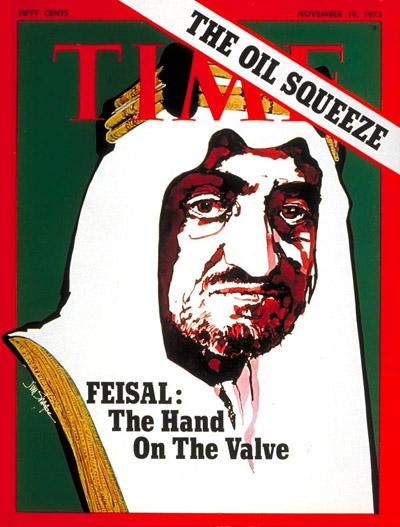During the 1973 Arab–Israeli War, Arab members of the Organization of Petroleum Exporting Countries (OPEC) imposed an embargo against the United States in retaliation for the U.S. decision to re-supply the Israeli military and to gain leverage in the post-war peace negotiations. Arab OPEC members also extended the embargo to other countries that supported Israel including the Netherlands, Portugal, and South Africa. The embargo both banned petroleum exports to the targeted nations and introduced cuts in oil production. Several years of negotiations between oil-producing nations and oil companies had already destabilized a decades-old pricing system, which exacerbated the embargo’s effects.
Effects
The effects of the embargo were immediate. OPEC forced oil companies to increase payments drastically. The price of oil quadrupled by 1974 from US$3 to nearly US$12 per 42 gallon barrel ($75 per cubic meter), equivalent in 2018 dollars to a price rise from $17 to $61 per barrel.
The crisis eased when the embargo was lifted in March 1974 after negotiations at the Washington Oil Summit, but the effects lingered throughout the 1970s. The dollar price of energy increased again the following year, amid the weakening competitive position of the dollar in world markets.
The Arab oil embargo ended the long period of prosperity in the West that had begun in 1945, throwing the world's economy into the steepest economic contraction since the Great Depression.
Impact on oil exporting nations
This price increase had a dramatic effect on oil exporting nations, for the countries of the Middle East who had long been dominated by the industrial powers were seen to have taken control of a vital commodity. The oil-exporting nations began to accumulate vast wealth.
Some of the income was dispensed in the form of aid to other underdeveloped nations whose economies had been caught between higher oil prices and lower prices for their own export commodities, amid shrinking Western demand. Much went for arms purchases that exacerbated political tensions, particularly in the Middle East. Saudi Arabia spent over 100 billion dollars in the ensuing decades for helping spread its fundamentalist interpretation of Islam, known as Wahhabism.
The oil embargo led a sudden interest in the Palestinian issue. On 8 November 1973, Kissinger became the first Secretary of State to meet with a Saudi leader since 1953 as he met King Faisal to ask him to end the embargo. Within two week of the embargo being launched, all of the foreign ministers of the nations of the European Economic Community met in a conference to issue a statement calling for Israel "to end the territorial occupation which has maintained since the conflict of 1967".
OPEC-member states raised the prospect of nationalization of oil company holdings. Most notably, Saudi Arabia nationalized Aramco in 1980 under the leadership of Saudi oil minister Ahmed Zaki Yamani.
Impact on the oil importing countries
The embargo had a negative influence on the US economy by causing immediate demands to address the threats to U.S. energy security. Macroeconomic problems consisted of both inflationary and deflationary impacts. The average US retail price of a gallon of regular gasoline rose 43% from 38.5¢ in May 1973 to 55.1¢ in June 1974. State governments asked citizens not to put up Christmas lights.
The Soviet Union was not a beneficiary of the oil crisis. The crisis prompted the USSR to raise energy prices within the Council on Mutual Economic Assistance (CMEA).
The embargo was not uniform across Western Europe. Of the nine members of the European Economic Community (EEC), the Netherlands faced a complete embargo. By contrast Britain and France received almost uninterrupted supplies. That was their reward for refusing to allow the US to use their airfields and stopping arms and supplies to both the Arabs and the Israelis.
Japan was hard hit since it imported 90% of its oil from the Middle East. It had a stockpile good for 55 days, and another 20-day supply was en route. Facing its most serious crisis since 1945 the government ordered a 10% cut in the consumption of industrial oil and electricity. Moscow tried to take advantage by promising energy assistance if Japan returned the Kurile Islands. Tokyo refused.
The oil shock destroyed the economy of South Vietnam. A spokesman for Nguyễn Văn Thiệu admitted in a TV interview that the government was being "overwhelmed" by the inflation caused by the oil shock. In December 1973, Vietcong sappers attacked and destroyed the petroleum depot of Nha Be, further depleting fuel sources.
Consequences
OPEC soon lost its preeminent position, and in 1981, its production was surpassed by that of other countries. Additionally, its own member nations were divided. Saudi Arabia, trying to recover market share, increased production, pushing prices down, shrinking or eliminating profits for high-cost producers. The world price, which had peaked during the 1979 energy crisis at nearly $40 per barrel, decreased during the 1980s to less than $10 per barrel.
The embargo encouraged new venues for energy exploration, including Alaska, the North Sea, the Caspian Sea, and the Caucasus. Exploration in the Caspian Basin and Siberia became profitable. Cooperation changed into a far more adversarial relationship as the USSR increased its production. By 1980, the Soviet Union had become the world's largest producer.
Heavily populated, impoverished countries, whose economies were largely dependent on oil—including Mexico, Nigeria, Algeria, and Libya—did not prepare for a market reversal that left them in sometimes desperate situations.
When reduced demand and increased production glutted the world market in the mid-1980s, oil prices plummeted and the cartel lost its unity. Mexico (a non-member), Nigeria, and Venezuela, whose economies had expanded in the 1970s, faced near-bankruptcy, and even Saudi Arabian economic power was significantly weakened. The divisions within OPEC made concerted action more difficult. As of 2015, OPEC has never approached its earlier dominance.
Megathreads and spaces to hang out:
- ❤️ Come listen to music and Watch movies with your fellow Hexbears nerd, in Cy.tube
- 💖 Come talk in the New Weekly Queer thread
- 💛 Read and talk about a current topics in the News Megathread
- 💚 Come and talk in the Daily Bloomer Thread
- ⭐️ September Movie Nominations ⭐️
reminders:
- 💚 You nerds can join specific comms to see posts about all sorts of topics
- 💙 Hexbear’s algorithm prioritizes comments over upbears
- 💜 Sorting by new you nerd
- 🌈 If you ever want to make your own megathread, you can reserve a spot here nerd
- 🐶 Join the unofficial Hexbear-adjacent Mastodon instance toots.matapacos.dog
Links To Resources (Aid and Theory):
Aid:
Theory:



